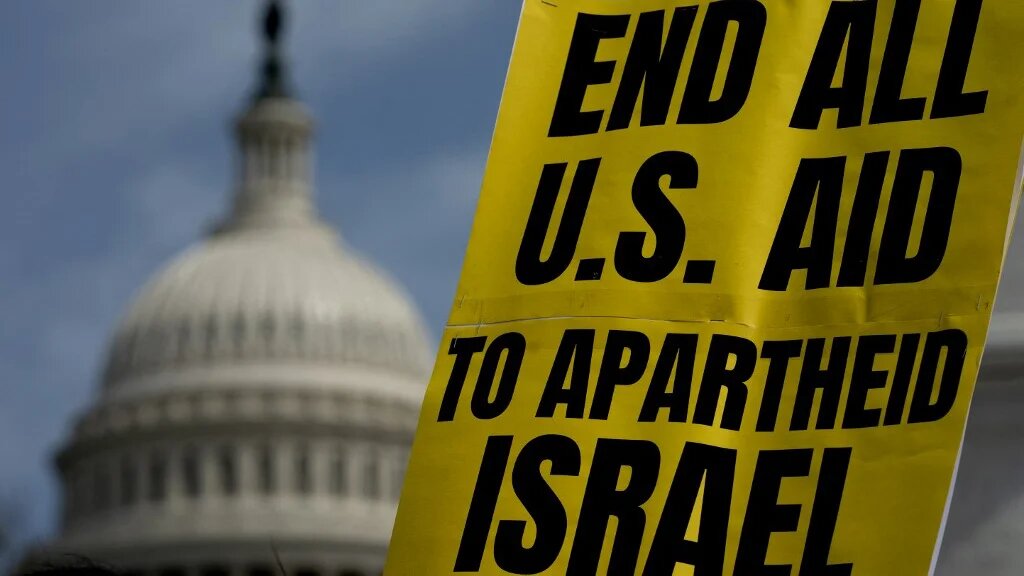![]()
Why I violated the IHRA definition of antisemitism
24 April 2025
This thinly veiled attack on freedom of speech aims to curb any meaningful discussion of the Israel-Palestine conflict

Protesters criticise Israeli apartheid outside the US Capitol in Washington, DC, on 30 April 2022 (Stefani Reynolds/AFP)
On 17 April, the National Day of Action for Higher Education, dozens of scholars of Jewish studies, Holocaust studies and Middle Eastern studies - myself included - took part in an organised effort to intentionally violate the International Holocaust Remembrance Alliance (IHRA)’s definition of antisemitism.
Defying the IHRA’s definition was an integral part of this day of resistance to Maga authoritarianism, in solidarity with higher education, which saw hundreds of rallies, teach-ins and webinars across the United States.
The IHRA definition of antisemitism, which is endorsed by Washington, is a thinly veiled attack on freedom of speech, academic freedom and free inquiry. It prevents scholars from describing and discussing the significance of well-documented historical and contemporary facts.
The definition attempts to censor discussions of the settler-colonialism, systemic racism, apartheid and now genocide that have informed the history and current policies of the state of Israel. According to the examples cited by the IHRA, stating that Israel is a racist endeavour constitutes antisemitism, even if one doesn’t say anything about Jews as a people or Judaism as a religion.
My public violation of the IHRA definition consisted of sending an instalment of my "Israel-Palestine Update" blog entry entitled "Passover: Holiday of Freedom and Resisting MAGA Authoritarianism", to a mailing list of about 700 and posting it on my website. In it I explained why Israel should be considered a racist, settler-colonial society.
Palestinians have long understood that Zionism is a form of settler-colonialism. Syrian-Palestinian scholar Fayez Sayegh did not use the precise term “settler-colonialism” in his 1965 monograph “Zionist Colonialism in Palestine”, but he described the Zionist project as a “settler community” and Israel as a “settler state”. Today, Sayegh’s work is a common starting point for those seeking to comprehend Palestine/Israel as a settler-colonial formation.
Gershon Shafir was one of the first Israeli scholars to categorise the Zionist project as a variety “of European overseas expansion … from the sixteenth through the early twentieth centuries”. His 1989 book, Land, Labor and the Origins of the Israeli-Palestinian Conflict, 1882-1914 also does not use the precise term “settler-colonialism” - though like Sayegh, his classification of varieties of colonialism deploys similar words, building on the analyses of historians D K Fieldhouse and George Fredrickson.
Shafir designates the era of the first wave of Zionist immigration (First Aliyah, 1882-1903) as an inhibited “pure settlement drive” that reconciled itself to becoming a “plantation type colony”, and the second wave of immigration (Second Aliyah, 1904-1914) as a renewed “pure settlement drive” comparable to Rhodesia or Algeria, which ultimately developed into a “separatist method of pure settlement”. He locates Israel “within the general phenomenon of settlement societies”.
Settlement and colonisation
One strong reason for understanding the Zionist project as a variety of settler-colonialism is that settlement and colonisation were terms commonly used by Zionist leaders and ideologues from the inception of the movement in the late 19th century until the post-World War II era of decolonisation.
In The Jewish State (1896), the book that launched the World Zionist Organization, Theodor Herzl envisioned a future Jewish state in Palestine as “a rampart of Europe against Asia, an outpost of civilization as opposed to barbarism” - classic European colonial and racialist language.
In 1902, Herzl drafted a letter to British South African politician Cecil Rhodes, asking him to put his stamp of authority on the Zionist project because “it is something colonial”. The first Zionist bank was called the Jewish Colonial Trust.
I could not fully participate in my academic field if the IHRA definition became the policy of Stanford University or was enshrined in US law
Like all settler societies, the Zionist settlement in Palestine and the creation of the state of Israel were necessarily supremacist projects - in this case, Jewish supremacy. Since its founding, Israel has awarded rights and privileges to Jews and denied them to non-Jews.
Israel’s system of separate and unequal laws has been described as apartheid by Amnesty International, Human Rights Watch and Oxfam, as well as the Israeli human rights NGO B’Tselem, applying the same human rights standards to Israel that apply to all other countries.
I am a scholar of modern Middle East history, and my area of study includes Israel/Palestine. I could not fully participate in my academic field if the IHRA definition became the policy of Stanford University or was enshrined in US law. Engaging in the contemporary discourse of our discipline requires us to violate the IHRA definition.
Of course, not all Middle East scholars agree, but I concur with the prevailing view that Israel is a settler-colonial project. It has enshrined structural racist oppression of Palestinians by enacting more than 60 laws to ensure Jewish supremacy and discriminate against Arabs. This meets the definition of racism according to the International Convention on the Elimination of All Forms of Racial Discrimination, adopted by the UN in 1965.
Dismantling structural racism
As Shafir suggests, settler-colonialism is a mode of understanding the historical sociology of settler societies, not a moral category. Settler-colonialism explains the process by which settlers come to see themselves as belonging to the land. They form a new society that is distinct from, even if connected to, the country or countries from where they came.
Jews who immigrated to Palestine and Israel, although many of the pioneers were secularists, drew on the long history of diasporic Jewish religious attachment to Eretz Yisrael (the land of Israel). But the cultural slogans of the Zionist community in Palestine and the early state of Israel included the negation of the diaspora; establishing a Hebrew-speaking community in Palestine as opposed to Yiddish or German speaking diaspora Jewish communities; and the cultivation of a "new Hebrew man" (or woman) - a manual labourer and fighter, as opposed to cosmopolitan intellectuals, religious traditionalists, or bourgeois German and American assimilationists.
Israelis became a distinctive kind of Jew, connected to, but culturally and politically different from, centres of Jewish life in the diaspora, which were not - and could never be - fully negated, because most Jews who had a choice preferred to live there. This helps explain the divergence between the sensibilities of Israeli and American Jews today.

Antisemitism: What is the IHRA definition and why is it controversial?
The category of settler-colonialism is not the only thing we need to know about Israel/Palestine. It doesn’t explain why, and under what circumstances, Jews transformed a religious attachment to Zion and the Messianic hope for redemption into a modern political ideology.
It does not fully explain how what began as a nationalist movement seeking to liberate European Jews from antisemitic oppression adopted the strategy of forging alliances with British, French and ultimately US imperialism. It doesn’t explain the sharp, and sometimes violent, tensions among the various currents of Zionism.
It doesn’t explain how Holocaust survivors found a refuge in Israel when other places they would have preferred to go would not take them. But it does explain why the more militant, statist, ethno-nationalists currents in Zionism prevailed over cultural Zionists, bi-nationalists, and others who, probably naively, sought some form of accommodation with Palestinians.
The hegemony of militant ethno-nationalist Zionism allied with politicised messianism likely means that dismantling Israel’s structural racism will require a protracted process of decolonisation.
In order to accomplish that we need to be able to speak and debate openly the structural racism and apartheid rooted in Israel’s formation as a settler colonial society.
Joel Beinin is the Donald J. McLachlan Professor of History, Emeritus at Stanford University. He taught at Stanford from 1983 to 2019 with a hiatus as Director of Middle East Studies and Professor of History at the American University in Cairo in 2006-08. In 2002 he served as president of the Middle East Studies Association of North America. He has written or edited twelve books, among them: A Critical Political Economy of the Modern Middle East (Stanford University Press, 2021), co-edited with Bassam Haddad and Sherene Seikaly
https://www.middleeasteye.net/opinion/why-i-violated-ihra-definition-antisemitism